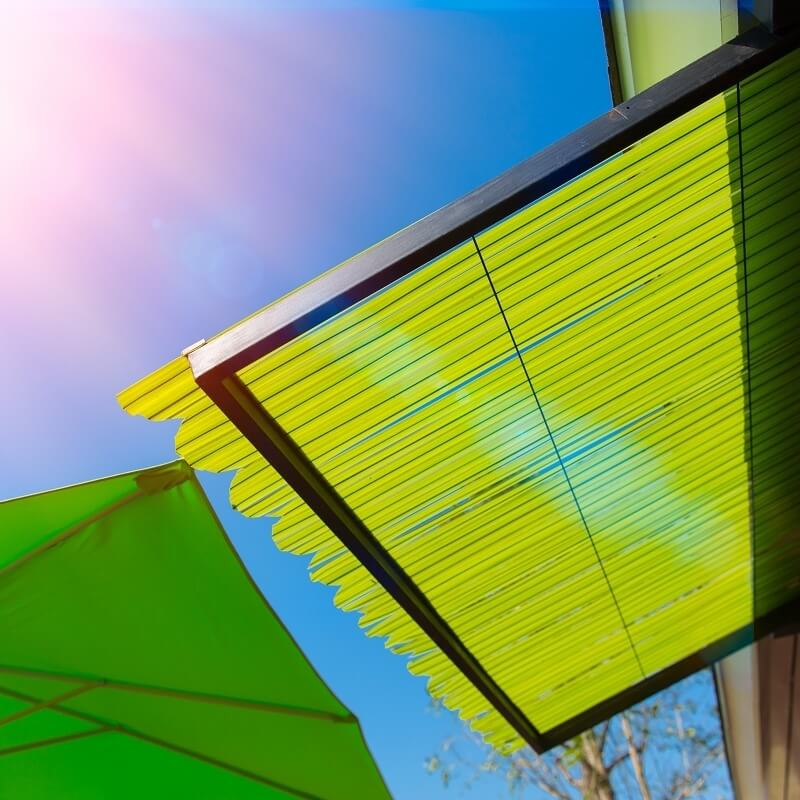Tips for Working with Polycarbonate Sheets

Polycarbonate is one of the strongest and most impact resistant plastic materials available on the market today. While it's approved for use in security products like storm shelters and protective countertop systems, it can also work in a variety of applications around your home or small business. Basically, any surface that needs to be able to withstand impact from heavy equipment, tools, or debris may benefit from the strength and durability that polycarbonate sheets have to offer.
Whether you need a strong surface for a greenhouse roof or workshop shelving unit, polycarbonate sheets may be the perfect DIY solution. However, it's important to first understand the qualities of this material so you can make the most of it during your project. Here are some tips for working with polycarbonate sheets, perfect for home projects or DIYers.
Choose the Right Style
On its own, polycarbonate may be vulnerable to fading from UV rays, abrasion from weathering, and scratches from debris. However, there are versions available with film that provide extra protection from these various elements. Purchasing the right type of polycarbonate can help you make sure that your DIY project actually stands the test of time.
For example, if you're building a greenhouse or purchasing polycarbonate sheets to fit over a pergola or other outdoor structure, it's important to purchase UV-resistant sheets, rather than basic polycarbonate. These come with a protective coating that is more resistant to the rays and can help to prevent discoloration over time. Otherwise, you may need to replace it in short order after it begins to fade.
If you plan on using polycarbonate sheets in an environment where it will be exposed to extreme weathering or abrasion, like on top of a workbench or in a garage, then you may want an abrasion resistant coating that provides a harder and more durable surface. Though polycarbonate is extremely impact resistant, it can scratch. With this coating, it should be less likely to show signs of wear over time.
If you need your polycarbonate sheeting to support a lot of weight, like if you're using it for storage or temporary floor coverings, then you might consider polycarbonate twinwall instead of basic sheets. This product is basically two sheets of polycarbonate that run parallel to one another and are attached with interior pieces of plastic support. This reinforces the material so it's less likely to bend or warp when put under extreme stress.
Keep Away From Extreme Heat
Polycarbonate is a thermoplastic, so it can be formed and molded into various shapes when heated past its melting point. This makes it a very versatile material that can work in a wide array of applications. However, it's fairly heat resistant, so it requires some pretty extreme temperatures before it can be easily shaped.
For DIYers, fabricating polycarbonate in this way is pretty advanced. You're better off purchasing the plastic material in the basic shapes and sizes that you need for your project and then attaching it to the structures you're working on. Additionally, if you're not trying to form your polycarbonate sheets, make sure you keep it away from flames, appliances, or equipment that could produce extreme heat and melt or bend the plastic out of its original shape.
Don't Attempt to Cut
The main benefit of polycarbonate is its impact resistance. It is extremely hard and difficult to break. This also means that it is difficult to cut to specific sizes and shapes without specialized equipment. Attempting to do so can lead to damage and may not be especially safe for DIYers.
Luckily, there are specialized pieces of equipment that plastics fabrication vendors can use to easily cut polycarbonate sheets and other products to size. These materials are not practical for the average DIYer, so it's much easier for those working on home improvement projects or small repairs to simply purchase polycarbonate in the sizes and forms they need for specific tasks.
Clean Regularly
Polycarbonate is a fairly durable and low maintenance material. Once you're done working with it in your projects, you shouldn't need to do much to keep it looking and functioning like new, aside from keeping it away from high heat and sharp or jagged edges. However, you may want to clean it every once in a while to keep it clear.
To do this, simply go over it with a soft cloth and warm, soapy water. Avoid using brushes, dirty cloths, or abrasive cleaning agents, which can scratch the surface. Additionally, go over it with a dry cloth once you're done cleaning to prevent water spots from forming.
Strong Polycarbonate Sheets at Sheet Plastics
If you're interested in working with polycarbonate sheets for any projects around your home or small business, we can help. We offer polycarbonate in a wide array of colours and styles, including those that are resistant to UV rays and abrasion. We also cut materials to size, ensuring that they're ready to use in your projects right away. In addition to polycarbonate, we carry a wide array of other quality plastic materials like twinwall polypropylene, acrylic, UHMW, PETG, foamboard, and PVC, among others. If you're ready to get started on your next project and are looking for quality polycarbonate sheets or other plastic materials, visit our website today to start customising your next order.







